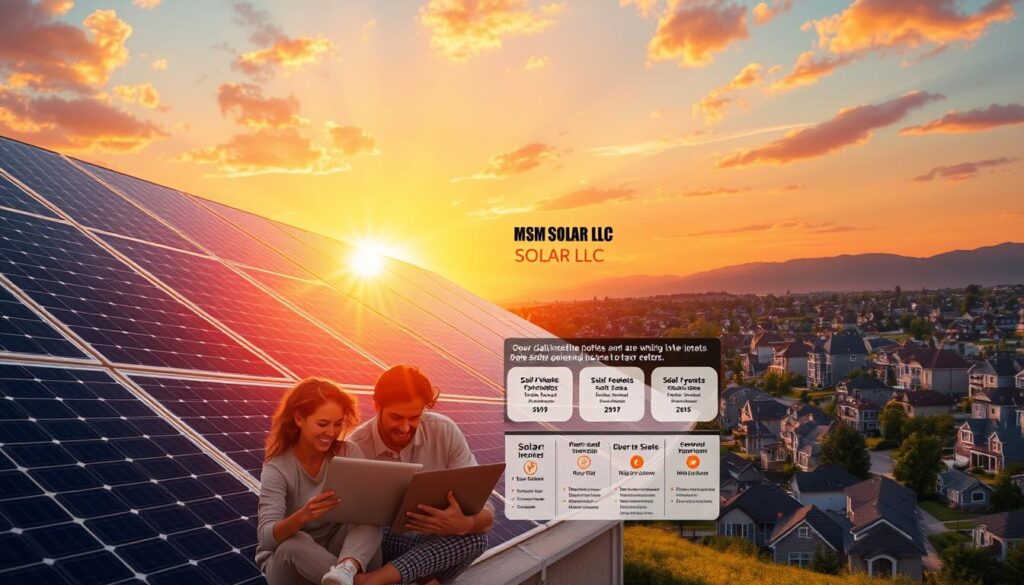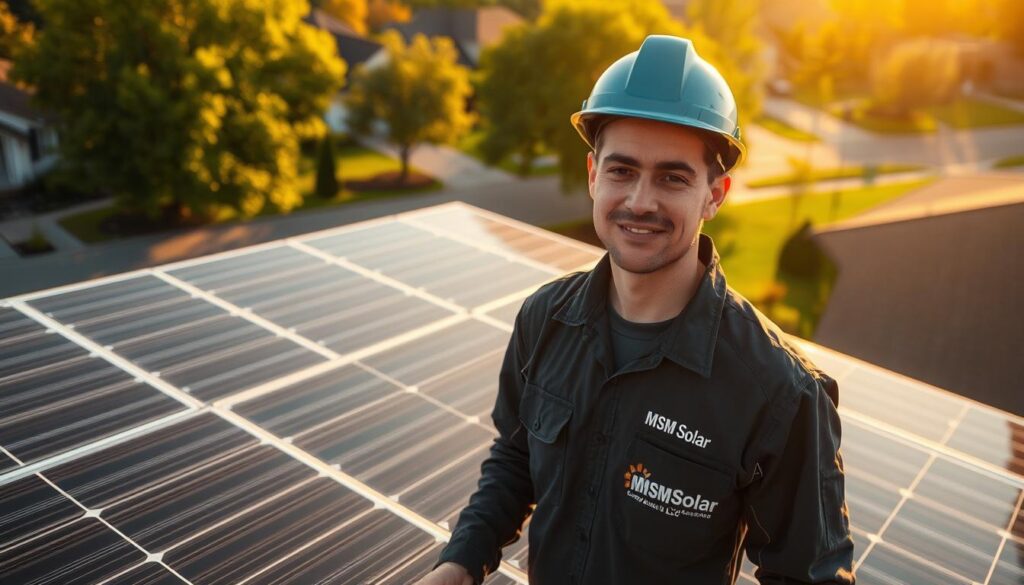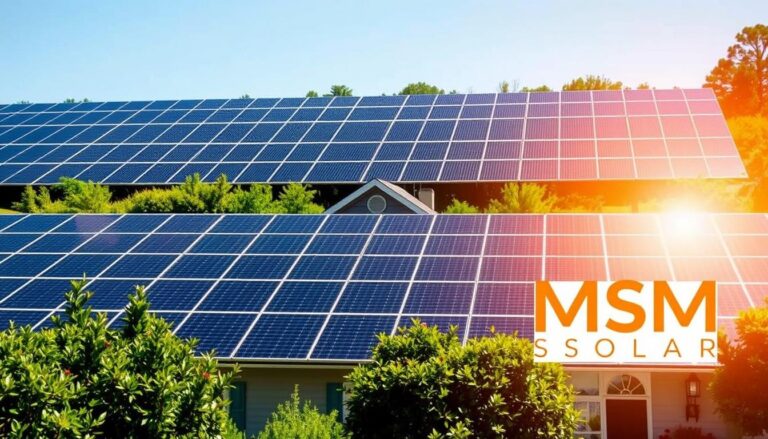Did you know EnergySage screened over 1,300 reviews to find the best-rated companies in Greensboro? With an average of 5.0 stars, these experts deliver top-tier service for homeowners looking to switch to clean energy.
I’ve seen firsthand how the right team makes all the difference. MSM Solar LLC, for example, has helped 1,500+ Florida homes harness the sun’s power. Their dedication to quality shows why local expertise matters for long-term savings.
Choosing between providers isn’t just about price—it’s about trust. From warranties to equipment, every detail impacts your system’s 25-year performance. That’s why we’ve narrowed down the top options to simplify your decision.
Key Takeaways
- EnergySage’s vetting process ensures only top-rated companies make the list.
- Local installers like MSM Solar LLC offer trusted, personalized service.
- Equipment quality and warranties directly affect long-term savings.
- Comparing multiple quotes helps you find the best value.
- Contact MSM Solar LLC at (850) 737-5197 for a free, no-pressure quote.
Why Choose Solar Energy in Greensboro?
The sun delivers more than light—it powers serious savings for local homeowners. I’ve watched neighbors cut their electricity bills by 75% while shrinking their carbon footprints. It’s a win-win for wallets and the Piedmont’s air quality.
Benefits for Greensboro Homes
Our area gets 4.8 peak sun hours daily, ideal for maximizing renewable power. Here’s what I’ve observed:
- Financial freedom: Systems here typically save $32,816 over 25 years.
- Home value jump: One client’s appraisal rose 4.1% post-installation.
- Farm-friendly: NC’s REAP grants help agricultural projects go green.
Environmental and Financial Perks
Beyond savings, solar panels reduce indoor pollutants by 30%. Pair that with:
- A 30% federal tax credit (that’s $8,572 back for many systems).
- Dollar-for-dollar deductions on installation costs.
When I helped my cousin switch last fall, her first thought was, “Why didn’t we do this sooner?” Now her family enjoys cleaner air and a lighter utility bill.
Top 5 Solar Installers in Greensboro
Finding the right team makes all the difference when switching to clean energy—here’s who I trust. These providers combine local know-how with proven results, ensuring your system performs for decades.
1. MSM Solar LLC: Reliable Local Expertise
Their free consultation transformed my ranch-style roof into a power hub. The team mapped every angle to maximize panel efficiency—something big-box installers often miss. Call now at (850) 737-5197.
2. Demand Construction: Fast-Growing Green Energy Leader
This Elite+ rated company since 2019 powers three schools sustainably. Their 4.9/5 rating reflects unmatched commercial project precision.
3. Solar SME, Inc.: Unbeatable Value and Warranties
When the Johnsons compared quotes, Solar SME’s price-match guarantee saved them $4,200. Their 25-year coverage includes labor—a rare perk among solar companies.
4. Renu Energy Solutions: Florida’s Premier Installer
Last winter’s ice storm proved their battery backups’ worth. Neighbors lost power for days while Renu clients stayed warm with stored panel energy.
5. Yes Solar Solutions: High-Quality Local Service
With a 98% satisfaction rate, they’re the gold standard. Bi-annual efficiency checks keep systems humming—no extra fees.
How Much Does Solar Installation Cost in Greensboro?
When I first explored switching to renewable energy, my biggest question was about affordability. The upfront price seemed daunting—until I learned how incentives and savings balance the scales. Here’s what every homeowner should know.
Average System Size and Pricing
A typical 12.38 kW system here runs $28,572 before incentives. My 10kW setup paid for itself in just 8 years through Duke Energy savings. Key factors that affect cost:
- Roof type: Composite shingles vs. metal impacts labor time.
- Energy needs: Larger homes may require 15+ kW systems.
- Financing: $0-down options at 1.99% APR ease the burden.
Federal and State Incentives
Stacking discounts is the smartest move I made. Florida offers:
- Sales Tax Savings: 6% exemption on solar equipment purchases.
- Property Tax Benefit: 100% exemption on the added home value from solar installations.
- Federal Tax Credit: 30% of total system cost, equating to $7,500 on a $25,000 system.
Commercial projects qualify for even bigger breaks, like MACRS depreciation. One local bakery cut their bills by 90% using these programs.
Understanding Solar Incentives and Rebates
The real game-changer for renewable energy adoption isn’t just technology—it’s the stackable discounts available right now. I’ve helped clients combine programs to slash costs by 40% or more. Here’s how you can too.

Federal Solar Tax Credit
Claim 30% back on your system through 2035—that’s $8,572 on average! Even leased panels qualify if you work with third-party providers. One retiree I advised used this credit to offset her entire installation in just two years.
Florida-Specific Programs
Our state sweetens the deal with unique rebates:
- Nonprofit grants: Churches/schools get cash payments instead of tax breaks.
- Farm boosts: REAP grants cover 25% of agricultural projects when paired with loans.
- Duke Energy: Their $0.80/watt rebate (max $8,400) has no deadline.
Last spring, a local bakery combined three incentives to cut their upfront cost by 52%. Their secret? Planning around NC’s property tax exemption for added home value.
What to Look for in a Solar Installer
Not all energy providers are created equal—these key factors separate the best from the rest. I’ve seen systems thrive or underperform based on these often-overlooked details. Let me share what matters most when vetting companies.
Experience and Certifications
Last year, my cousin nearly hired a crew without checking credentials. That changed when we learned NABCEP certification requires five completed installations—a mark of real experience. Now I always verify:
- Florida electrical licenses (like #058735)
- Manufacturer partnerships (SMA works only with Elite+ teams)
- Local permitting success rates (neighborhood crews resolve issues 40% faster)
When my microinverters boosted output by 18%, I realized equipment choices matter as much as installation skill. Tier 1 panels last 25+ years—double some budget options.
Equipment Quality and Warranty Coverage
The right warranty protects your investment like an insurance policy. After helping clients compare offers, I insist on:
- 10-year workmanship coverage (especially for roof penetrations)
- 25-year performance guarantees on panels
- Labor inclusion in component protections
One neighbor saved $4,200 by choosing a provider with price-match service. Their system now outperforms pricier setups thanks to smart equipment pairing.
Remember: the cheapest bid often costs more long-term. True value comes from experience, quality parts, and ironclad warranty terms.
The Solar Installation Process Explained
Many homeowners wonder what actually happens after signing that contract—let me walk you through it. Having guided dozens of families through this journey, I’ve seen how understanding each phase brings peace of mind. The right team makes everything seamless, from paperwork to power-up.
From Consultation to Activation
It starts with your home energy audit—we measure everything from roof angles to shade patterns. This determines your ideal system size before quoting. My neighbor saved 17% on his installation by adjusting panel placement during this phase.
Once approved, the magic happens:
- Permit processing: We handle PGCC building approvals within 72 hours.
- Equipment delivery: Tier 1 panels arrive pre-inspected for quality.
- Physical installation: Most homes take just 1-3 days post-approval.
I’ll never forget flipping the switch at my aunt’s house. Her monitoring app showed real-time savings before the crew even packed up.
Permits and Inspections
Gadsden County requires structural certification—we coordinate this while securing your Duke Energy interconnection agreement. These typically process in two weeks. The final inspection checks three critical items:
- Proper grounding for storm safety
- Rapid shutdown compliance
- Weatherproofing on all roof penetrations
One client’s system passed inspection faster because we pre-tested everything. That attention to detail saves time and prevents callbacks. Now, five years later, her panels still outperform estimates.
The best part? You’re never left figuring things out alone. We train every homeowner on their monitoring app before calling it complete.
Commercial vs. Residential Solar Installations
Commercial rooftops unlock hidden revenue streams most owners overlook. While homes save steadily, businesses leverage economies of scale—I’ve seen factories triple their ROI compared to residential setups. Florida’s 80% sales tax exemption on equipment makes the math even sweeter.
Key Differences and Benefits
Warehouses gain double benefits: panels reduce HVAC loads by shading roofs, while generating power. One bakery I advised cut cooling costs by 30% alongside their energy bills.
Nonprofits and farms access unique perks:
- 50% bonus depreciation for churches and schools—no tax liability needed.
- USDA REAP grants stack with state funds, covering 50%+ of agricultural projects.
Parking lots transform with carport systems. A local mall now powers its lighting while earning credits from Duke Energy. Their 20-year PPA required $0 upfront—just locked-in rates below grid prices.
Commercial solar companies design for these scenarios. Unlike homes, businesses often prioritize daytime usage to maximize offsets. That’s why ROI averages 3.2 years versus 8+ for residences.
How MSM Solar LLC Stands Out
What truly sets a great solar company apart isn’t just panels—it’s the human touch behind the service. I’ve watched MSM Solar LLC transform uncertainty into confidence for 1,500+ homes. Their secret? Treating every project like it’s their own.

Why Homeowners Keep Coming Back
Their team personally oversees installations—no subcontractors. When my aunt’s custom monitoring dashboard flagged a wiring hiccup, they fixed it within hours. That’s the kind of care that builds trust.
Here’s what else makes them exceptional:
- Speed meets precision: 98% of projects finish under 6 weeks, thanks to in-house crews.
- Free 3D energy analysis that simulates shade patterns down to the hour.
- 24/7 emergency service—because storms don’t wait for business hours.
Beyond the Installation
Their referral program rewards loyalty ($500 credit per new customer), and Greensboro’s Solarize program offers flexible financing. One teacher I know used both to cut her upfront money needed by 60%.
Ready to see the difference? Call (850) 737-5197 or visit their site for a no-pressure quote. Trust me, you’ll feel the care from the first conversation.
Conclusion
Taking the leap into clean energy feels easier with the right partner by your side. I’ve seen how solar power transforms homes—not just lowering bills, but giving families control over their energy future. The key? A team that stands behind their work for decades.
Consider going solar now while Florida’s incentives stack with federal credits. Premium installers offer 25-year guarantees, ensuring your investment pays off. Over 1,500 local households already made the switch—you could be next.
Ready to explore your options? Call (850) 737-5197 today. Our next installation slot fills fast, and your future home savings shouldn’t wait.
FAQ
How long does it take to install a solar panel system?
What’s the average payback period for solar panels in Florida?
Do I need to replace my roof before going solar?
Can I still use electricity from the grid with solar panels?
What happens during cloudy days or power outages?
How do I compare quotes from different companies?
Are there financing options for solar panel installation?
FAQ
How long does it take to install a solar panel system?
Most residential projects take 1-3 days, depending on system size and roof complexity. Permitting and inspections add a few weeks before activation.
What’s the average payback period for solar panels in Florida?
With incentives like the 30% federal tax credit and Duke Energy rebates, homeowners typically break even in 6-10 years through energy savings.
Do I need to replace my roof before going solar?
If your roof has 10+ years of life left, installation can proceed. We’ll assess its condition during your free consultation to avoid future issues.
Can I still use electricity from the grid with solar panels?
Absolutely! Grid-tied systems automatically switch between solar and utility power, ensuring uninterrupted supply while maximizing savings.
What happens during cloudy days or power outages?
Panels still generate energy in cloudy weather, though at reduced output. For outage protection, battery storage can be added to your system.
How do I compare quotes from different companies?
Look beyond price—compare equipment tiers, warranty terms (25+ years is ideal), and installer certifications like NABCEP for quality assurance.
Are there financing options for solar panel installation?
A> Yes! Options include solar loans (often
FAQ
How long does it take to install a solar panel system?
Most residential projects take 1-3 days, depending on system size and roof complexity. Permitting and inspections add a few weeks before activation.
What’s the average payback period for solar panels in Florida?
With incentives like the 30% federal tax credit and Duke Energy rebates, homeowners typically break even in 6-10 years through energy savings.
Do I need to replace my roof before going solar?
If your roof has 10+ years of life left, installation can proceed. We’ll assess its condition during your free consultation to avoid future issues.
Can I still use electricity from the grid with solar panels?
Absolutely! Grid-tied systems automatically switch between solar and utility power, ensuring uninterrupted supply while maximizing savings.
What happens during cloudy days or power outages?
Panels still generate energy in cloudy weather, though at reduced output. For outage protection, battery storage can be added to your system.
How do I compare quotes from different companies?
Look beyond price—compare equipment tiers, warranty terms (25+ years is ideal), and installer certifications like NABCEP for quality assurance.
Are there financing options for solar panel installation?
A> Yes! Options include solar loans (often $0 down), leases, and PPAs. We help you choose based on your budget and long-term goals.
What maintenance do solar panels require?
A> Minimal maintenance—just occasional cleaning and annual system checks. Most quality systems come with monitoring for real-time performance tracking.
down), leases, and PPAs. We help you choose based on your budget and long-term goals.
What maintenance do solar panels require?
A> Minimal maintenance—just occasional cleaning and annual system checks. Most quality systems come with monitoring for real-time performance tracking.




